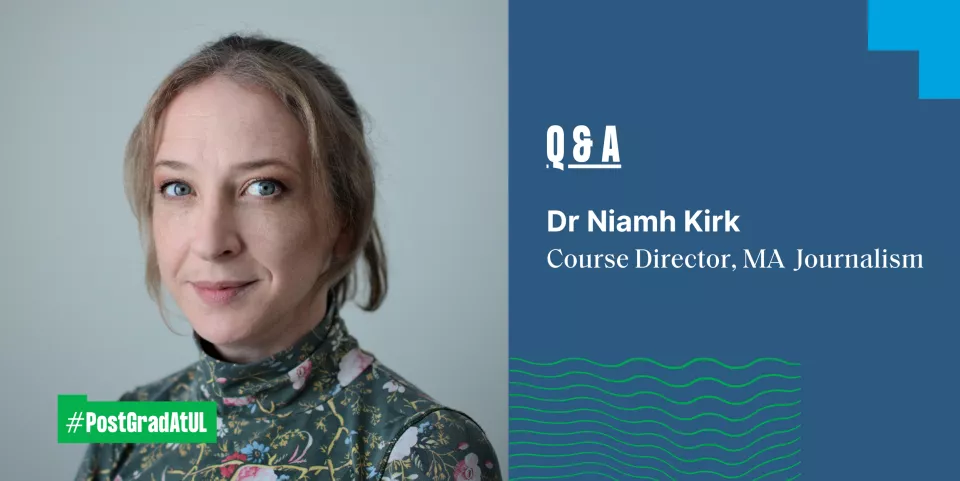
Dr Niamh Kirk is an Assistant Professor in Data Journalism and Social Media, and Course Director of the MA in Journalism at University of Limerick.
Prior to this, Dr Kirk was the Microsoft Newman Fellow in Digital Policy working with the Centre for Digital Policy in University College Dublin. Niamh has also worked as a postdoctoral researcher on the Horizon 2020 project Repast, investigating how European societies deal with their troubled pasts today through the analysis of conflict discourses.
How does the Masters programme compare to other similar programmes?
This Masters is unique in that students can take one of two key pathways, news and sports, developing a specialisation. At UL students learn to produce journalism across wide range of media, radio, podcasting broadcast, print and other digital platforms. As well as learning key skills for future employment, students also get to network with key figures in the Irish media industry through regular talks and workshops on campus. The programme is also flexibly delivered and is offered one-year full time or two years part time, with all classes taking place on Mondays and Tuesdays with the rest of the week available for field work and studio access . Students also have the opportunity to exit with a Graduate Diploma in Journalism if they do not wish to complete an MA Dissertation.
The modern on campus facilities that UL offers including a designated radio and TV studio and dedicated newsroom for our journalism students ensures that students taking this programme have all the resources they need to develop and hone their skills in a supportive and encouraging environment.
What is the focus of the curriculum and how is the programme structured?
The focus of the curriculum is on experiential hands-on learning and is not a typical postgraduate programme in that regard, in that students “learn by doing”.
The mix of modules focused on different forms of media such as news writing, video and radio journalism, PR and communications, data journalism, sports reporting and feature writing give our students a wide range of transferable skills needed in this fast-paced industry. Being a good journalist in this context requires a “nose for a story” but also the ability to rapidly manage and produce audio visual, print and social media content all of which is replicated throughout the modules in this programme.
Bespoke MA in Journalism, News and MA in Journalism, Sport pathways ensure graduates have the basic skillsets required to do journalism, as well as specialised knowledge in their chosen field.
What skills or knowledge do applicants need to complete this programme?
No previous experience in Journalism is necessary to complete the programme. Applicants to the MA normally have a Second Class Honours primary degree but if applicants to do not have this qualification their application can be assessed using the University’s policy on recognition of prior learning which allows students to gain recognition for their previous relevant work experience when submitting their application. Our students come from a variety of diverse backgrounds and experiences and the course is really structured to give those that do not have any previous background in media the skills to pursue a career in this area and other related fields.
What can applicants do to improve their chances of admission?
It is advisable for any applicant to have all relevant material (where possible) submitted with their initial application. If an applicant has any digital media or articles either print or digital that they previously produced, it is always good to include this in their application. It is not a requirement to have this to gain entry onto the MA programme but does give me an insight into the applicant and their interests.
I would also encourage students to apply early to avoid disappointment. There are limited places on the programme so it also beneficial to apply early and accept the place as soon as it is offered.
What are the career prospects upon completion of the course?
We have found that the majority of our recent graduates are in full time employment in regional, national and international media outlets. We have graduates working for national newspapers such as the Irish Times and new outlets such as RTE (Ireland’s national broadcaster), BBC and CNN amongst others
Curious about the MA Journalism at UL?

